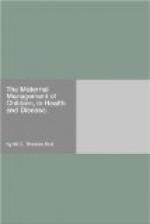[FN#22] It is a matter of importance in bathing children, that they should not be terrified by the immersion, and every precaution should be taken to prevent this.
As a remedy, sea bathing is highly serviceable. Its employment, however, requires much caution, and great mischief is sometimes committed by its indiscriminate use.
The child of a strumous habit may be greatly benefited by sea bathing, united with a few years’ residence on the coast. Indeed, by carefully following up a course of sea bathing, a suitable diet, and a judicious mode of living, the very temperament of the individual may be all but changed, and a power and activity imparted to the system, productive eventually of comparatively strong and robust health. A parent will do wisely, therefore, to send a child of such a habit to a school on the coast. Great caution, however, must be observed when bathing is commenced, lest the shock be too powerful for the energies of the system, and be not followed by the necessary degree of reaction. It will be prudent to begin with the tepid bath (85 degrees to 92 degrees), and gradually reduce the temperature until the open sea can be resorted to without fear. The measures already mentioned for promoting reaction—exercise previous to immersion; the immersion at first only momentary, and followed by strong friction—must be diligently regarded in such a case.
In the child of a delicate and feeble habit, much out of health, whose general debility is dependent on some organic disease, sea bathing is not only improper, but dangerous. Instead of being strengthened, such a child will be rendered more weak and debilitated. On the other hand, when the child is of a weak and relaxed habit, but free from organic disease, the cold bath will be highly useful, provided sufficient power of reaction exist in the system. In this case the skin and flesh of the child is relaxed and flabby; there is a great tendency to warm perspirations in bed, capricious appetite, confined or relaxed bowels, indisposition to exertion, and weariness from the slightest effort.
THE SHOWER BATH.
The effects of the shower bath are, on the whole, similar to those of the plunge bath of the same degree of temperature, except that the immediate shock of the shower bath is in general felt to be greater than that from simple immersion. This, however, may be met by putting warm water into the bottom of the bath in sufficient quantity to cover the ankles of the individual taking the bath, which tends at once to lessen the shock, and to increase the reaction.




